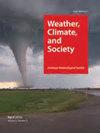基于影响的乌干达农村生计洪水预警
IF 1.9
4区 地球科学
Q3 ENVIRONMENTAL STUDIES
引用次数: 0
摘要
人们越来越多地在极端洪水事件发生前采取预期行动,以减少对生命和生计的影响。需要当地情境化的信息来支持实时的当地决策,决定何时何地采取行动以及采取何种预期行动。本研究定义了一个基于影响的预警触发系统,该系统将洪水预报与作物日历等生计信息相结合,以更好地针对预期行动。我们通过乌干达Katakwi地区的洪水案例研究来演示该触发系统的应用。首先,我们将当地作物周期信息与洪水预报相结合,以定义基于影响的触发系统。其次,我们使用历史洪水影响信息验证基于影响的系统,然后在人道主义决策的背景下将其与现有的基于灾害的系统进行比较。研究结果表明,与基于灾害的触发系统相比,基于冲击的触发系统具有更高的洪水探测概率。在基于影响的系统中,错过事件的数量更少,而两个系统中的触发日期相似。在人道主义方面,这两种制度同时引发预期的行动。然而,基于影响的触发系统可以在不同的背景下进一步调查(例如,为了生计保护),以评估当地信息的价值。基于影响的系统还可以提供一个宝贵的工具来验证现有的基于危害的系统,从而使人们更有信心将其用于通知预期行动。因此,研究结果应为进一步对话开辟道路,讨论基于影响的触发系统在更广泛的基于预测的行动框架内对建立风险社区的复原力可能意味着什么。本文章由计算机程序翻译,如有差异,请以英文原文为准。
Impact-based Flood early warning for rural livelihoods in Uganda
Anticipatory actions are increasingly being taken before an extreme flood event to reduce the impacts on lives and livelihoods. Local contextualised information is required to support real-time local decisions on where and when to act and what anticipatory actions to take. This study defines an impact-based early warning trigger system that integrates flood forecasts with livelihood information, such as crop calendars, to target anticipatory actions better. We demonstrate the application of this trigger system using a flood case study from the Katakwi District in Uganda. First, we integrate information on the local crop cycles with the flood forecasts to define the impact-based trigger system. Second, we verify the impact-based system using historical flood impact information and then compare it with the existing hazard-based system in the context of humanitarian decisions. Study findings show that the impact-based trigger system has an improved probability of flood detection compared to the hazard-based system. The number of missed events are fewer in the impact-based system while the trigger dates are similar in both systems. In a humanitarian context, the two systems trigger anticipatory actions at the same time. However, the impact-based trigger system can be further investigated in a different context (e.g., for livelihood protection) to assess the value of the local information. The impact-based system could also provide a valuable tool to validate the existing hazard-based system, which builds more confidence in its use in informing anticipatory actions. The study findings should therefore open avenues for further dialogue on what the impact-based trigger system could mean within the broader Forecast-based Action landscape towards building the resilience of at-risk communities.
求助全文
通过发布文献求助,成功后即可免费获取论文全文。
去求助
来源期刊

Weather Climate and Society
METEOROLOGY & ATMOSPHERIC SCIENCES-
CiteScore
3.40
自引率
13.60%
发文量
95
审稿时长
>12 weeks
期刊介绍:
Weather, Climate, and Society (WCAS) publishes research that encompasses economics, policy analysis, political science, history, and institutional, social, and behavioral scholarship relating to weather and climate, including climate change. Contributions must include original social science research, evidence-based analysis, and relevance to the interactions of weather and climate with society.
 求助内容:
求助内容: 应助结果提醒方式:
应助结果提醒方式:


